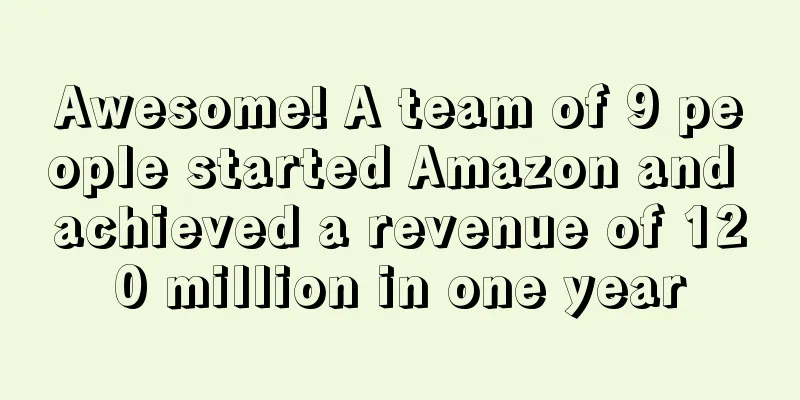Losses and running away! Is this the biggest "pitfall" of cross-border transactions?

|
The various pitfalls on the cross-border road ...
For cross-border sellers, problems may occur in almost every link, from purchasing, shipping, to operating stores. Sellers with sufficient funds may have enough funds to offset the cost of trial and error. However, for small sellers with weak risk resistance , these problems may be a fatal blow . If they are not careful, they will be trapped and eliminated. Not only will all their efforts be wasted, but they will also have to pay a large sum of money.
If someone asks: What is the biggest pitfall of doing cross-border e-commerce? Sellers may give a variety of answers, but behind each answer is a story of blood and tears.
Avoiding various risks on the cross-border e-commerce road has become a compulsory course for sellers . Today, I will tell you about the common pitfalls of cross-border e-commerce and the countermeasures.
The road to making money is not peaceful: there are pitfalls at every step, and each pit is different.
In recent years, China's cross-border e-commerce has developed rapidly, reaching 1.92 trillion yuan in 2021, an increase of 18.6%. This year, it will continue to maintain steady and rapid growth, and cross-border e-commerce B2B direct exports and cross-border e-commerce exports to overseas warehouses will grow rapidly. In terms of regions, the import and export volume through the customs cross-border e-commerce management platform in Zhejiang, Jiangxi and other places increased rapidly in the first three quarters. As China's fastest-growing, most potential and most powerful new foreign trade format, cross-border e-commerce has become a new driving force for foreign trade development, a new channel for transformation and upgrading, and a new tool for high-quality development.
However, cross-border e-commerce is like a besieged city, where people outside want to get in and people inside want to get out. People say that cross-border e-commerce is good, but they don’t know that benefits and risks coexist. There are pitfalls at every step on the road to making money. Even if you are careful, you never know where the next pit will be waiting for you.
In detail, what are the pitfalls that sellers often encounter in the process of cross-border e-commerce ? Weibo blogger "Factory Manager in the Wind" once counted 13 pitfalls in e-commerce. The editor thinks that most of them can be applied to the field of cross-border e-commerce. Based on his own experience, the factory manager summarized the pitfalls of e-commerce, including agent operation pit, professional extortion pit, order-brushing pit, online celebrity product-selling pit, intellectual property pit, image theft pit, quality inspection pit, order-brushing + Taoke pit, operation and third-party company collusion to cheat the boss pit, platform activity pit, free-riding pit and trademark pit, etc. It can be said that the history of e-commerce growth contains all kinds of blood and tears, and each pit may cost at least a few thousand or as much as a million dollars to fill.
From this, we can see that problems such as proxy operation, fake orders, freeloaders, and intellectual property rights are very common in the field of cross-border e-commerce. In addition, there are countless logistics pitfalls. Below, the editor combines the summary of factory managers and other people to talk about these common pitfalls in the cross-border e-commerce industry, so that everyone can avoid them quickly.
Professional extortion: using platform rules to extort money from sellers
Professional blackmailers are good at exploiting rules and extorting money in various ways, and every link of the operation will be affected. For example, deliberately using bad reviews to threaten sellers is a criminal offense, and it is usually used to defraud new stores. Or they specifically target sellers of no-name, knockoff, and imitation products to extort money. Or they make a big fuss about fake orders. Many buyers will ask sellers for more money after fake orders, and threaten sellers if they don't give it. Some people have never faked orders for sellers, but they take advantage of the sellers' weakness of fake orders and direct and act out the so-called fraud.
Freeloading trap: consumers do not spend money to buy goods, or return them after use
The main target of this is unscrupulous buyers. As we all know, e-commerce platforms such as Amazon all adhere to the principle of "the customer is God". In order to retain buyers to the greatest extent, they unconditionally favor buyers in terms of returns, etc., which gives some freeloaders an opportunity to take advantage of. Many consumers claim that the products are not good after a long time after buying things and apply for a refund. Even so, the platform will agree to the refund application; when Halloween, Christmas and other festivals come, it is the peak period for refunds. Unscrupulous consumers return the used products after the holidays, and often the sellers are unable to speak out at this time.
Intellectual property pitfall: malicious complaints, even if the seller's link is retrieved, the loss is heavy
For example, if a certain style is very common, even so, some companies will register patents and complain to their peers. At this time, the links of the sellers who are affected will be removed from the platform, resulting in heavy losses; or, some people with ulterior motives will professionally register intellectual property rights to complain to their peers. For example, the author of a certain pattern is from an external network, and the blackmailer registers it in China and it becomes his, and then a large number of complaints are made using the author of the pattern to claim compensation. In addition, there are many Amazon sellers who copy the products of their peers to their own independent sites, and then sue their peers for infringing their own products. Although this approach sounds ridiculous, it always allows the spoofers to successfully file complaints.
Peer pit: using unfair means, malicious competition to suppress peers
An obvious fact is that the product link ranked first in search volume is definitely very profitable, but it is also the most dangerous, especially for small and medium-sized sellers who do not have much funds. After reaching the top, they do not have much ability to protect themselves, because you have offended the interests of your peers. Some people, in order to pull you down the ranking, give bad reviews, maliciously complain about product infringement, image infringement, add banned words, etc. These are just very "childish" practices. There are many other means that make people shudder. If the seller's hot-selling link is spoofed and taken off the shelves, it will often cause more heavy losses because there are a lot of stock. So much so that some industry insiders have said that they don't want to be the first to do any business, and they just want to maintain the link in an upper-middle position to reduce the chance of being targeted by peers. They would rather make less money than be spoofed by peers.
Employee scam: copying company products or exploiting loopholes to defraud money
Bosses have always been the target of criticism. It is undeniable that there will always be individual employees in this industry who exploit company loopholes and defraud the company of money. For example, there are operations and third-party companies that work together to defraud bosses, create false data and defraud huge commissions and pit fees. The routines of off-site promotion can be said to be very sophisticated. Or some employees open stores privately while working, which is understandable, but some employees choose to sell the company's products, or sell products that are exactly the same as the company's.
The agency operation pit: charging high agency operation fees in the name of the official, but no sales
As long as the agency operation is mentioned, the majority of cross-border sellers will say: agency operation is to cut leeks. Despite all the criticism, it still cannot stop the agency operation companies from deceiving people.
It is understood that many agency companies will hold investment promotion meetings in the name of official platforms such as Amazon, eBay, and AliExpress, inviting factory owners and other wealthy and gullible people to participate, and use a series of preferential conditions to lure attendees to sign contracts immediately. In fact, these contracts are carefully prepared by the agency companies, and they will be in their favor when disputes arise later.
Many sellers thought that after paying tens of thousands of yuan, they would be able to make a lot of money. In fact, many operating companies are not professional. Apart from their profound knowledge in PPT, their ability to operate stores may not even be as good as the service objects. What is even more ridiculous is that the person in charge of store operation may not be one person managing one store, but one person managing more than a dozen stores. Sellers paid tens of thousands of yuan, not only did they get nothing, but also suffered losses of hundreds of thousands or even millions of yuan due to the ignorance of the other party.
As many people in the industry have said, agency operation is a business that is sure to make a profit. The main profit comes from service fees. In case the store makes money, you can still charge service fees. Even if it loses money, it is not your own money that is lost.
Supplier pitfall: no limit to copying products and creating hot-selling products yourself
Many suppliers not only supply goods to sellers, but also act as sellers themselves. At this time, they often choose to take shortcuts and sell the products of cooperating sellers without any bottom line, or move the sellers' popular products to their own stores for sale, or make a big fuss about the sellers' private model products.
Nowadays, if sellers want to create their own hot-selling products, they must spend their own money on research and development , find manufacturers to make patterns and molds , and customize products. The manufacturers are very clear about your sales volume . At this time, the manufacturers take the seller's customized version, make slight changes to it, and promote it to other merchants, and then they can ship it.
Another situation that sellers should be wary of is the "hot-selling pig-killing scheme", which means that suppliers create hot-selling products themselves. The common routine is that manufacturers use some cannon fodder accounts to send empty orders or not ship goods, and then use a 10% or 20% discount outside the website to boost sales. There are always many foreigners who are greedy for bargains and place orders, and then sales are very high in a short period of time, often reaching the top few in a small category, and then waiting for a large number of leeks to place orders. The cost of the manufacturer is only two or three thousand yuan for the cannon fodder account and one or two thousand yuan for off-site promotion, but it may receive tens of thousands of orders.
Logistics pitfalls: This year, freight forwarding companies have been exposed one after another, and their various tricks have pitted sellers
There is no shortage of talk about logistics companies running away or going bankrupt in the cross-border circle, and this year this phenomenon is particularly serious. It is almost a month when there is a crash. When the frequency is high, there is news of a freight forwarder running away every week. The number is so large that the onlookers are numb.
These logistics chaos are just the tip of the iceberg! "When you see a cockroach on the surface, it means there are already countless cockroaches behind it."
"Next, many logistics companies will collapse, and there will be another wave of freight forwarders running away. This is inevitable for both overseas warehouses and European back-ends." An insider told the editor that taking Europe as an example, customs clearance in Europe is stricter, and goods are frequently detained. It has always been a disaster area for freight forwarders running away. There will be a wave of running away every year at the end of the year, and this year the chaos will only be worse.
There has always been a mixed bag of logistics companies in the world. This year, many freight forwarders have continued to suffer losses, resulting in a broken capital chain. More tricks will inevitably emerge. The freight forwarders’ tricks are endless, and cross-border sellers are stepping on landmines in various ways.
Taking the common low prices as an example, many times, you may not be getting a bargain, but may be falling into a trap!
As we all know, customs often reports on cases of concealing and hiding dangerous goods. Don’t think that such things are far away from you. A very common practice of unscrupulous freight forwarders is to buy ordinary goods at a low price to cover up their dangerous goods and increase the probability of customs inspection. Once discovered, the seller will suffer "unwarranted disaster". Therefore, being cheap is not necessarily wrong, but there is definitely a risk!
It is also very common for freight forwarders to raise prices arbitrarily and charge fees in an opaque manner.
Many freight forwarders directly "rob" and disregard the spirit of the contract. They raise the price immediately after the goods are loaded, or refuse to ship the goods. Even if the seller has a reason, he cannot explain it; or they "play tricks in secret", all charges are not transparent, and they can find any excuse to cheat the seller out of a lot of money.
Of course, the issue of logistics timeliness is still widely criticized by sellers. It is not uncommon for sellers' goods to be delayed for a week at the shortest and half a year at the longest. Many freight forwarders "have a good attitude before receiving the goods, but do not reply after the incident", and do not take any remedial measures after the goods are delayed. A seller said that he cooperated with a freight forwarding company, which mainly dealt with dealers. Since this year, there have been constant problems. There are invoices for goods to be shipped in March, but customs clearance was completed in July. The serious delay caused the company to suffer considerable losses. He wanted to ask the other party for some compensation, but the other party threatened to detain the goods with a very arrogant attitude! In fact, this situation is not too bad. When the container is inspected, many freight forwarders will ask the seller to pay more money and share the loss ...
How should cross-border sellers avoid pitfalls? Here are the measures
The above pitfalls are not all inclusive. Cross-border e-commerce is so complex and the road is so tortuous that it is hard to avoid falling into pitfalls. Some sellers may fall into two or three pitfalls, and some may fall into almost all pitfalls. This requires sellers to master the pit avoidance methods. Next, the editor brings you the industry insiders' guide to avoiding pitfalls in intellectual property, agency operation and logistics.
Intellectual property protection: Weibo blogger "Amazon Product Development" said that in the past product development process, he encountered few patent infringement products . In many cases, he relied on sensitivity and experience to summarize several more efficient judgment methods. The accuracy may not be 100% , but it can effectively avoid infringement :
1. If the 1688 link title contains English, there is a high probability of infringement. 2. Amazon’s European and American stores, which only have one type of product and products with a strong sense of design, have a high probability of infringement. 3. As seen on tv / TikTok type products have a high probability of infringement. 4. If the product supply chain is unknown and is supplied by many traders , the probability of infringement is high . 5. It is obviously an old product, but it sells well with many new links , so the probability of infringement is high . 6. Basically, the products are shipped by the seller and the sales volume is considerable , so the probability of infringement is high . 7. If the image in the Amazon link is blurry and the description is simple but the sales volume is considerable , the probability of infringement is high. 8. The product itself has a strong sense of design, but the supply chain is easy to find , so the probability of infringement is high .
It also stated that some newer products on the market, as well as creams and liquids, basically have no infringement risks .
Avoid risks when engaging in agency operations: Weibo blogger “Jumu Haige” said that disputes over agency operations occur frequently, and in fact, both Party A and Party B have problems.
From the perspective of Party A, many of them think too highly of the agency operating company and believe that they can entrust everything to the agency operating company. In fact, the agency operating company is just a babysitter and they have to raise their children by themselves.
When cooperating with an agent, sellers do not have to operate the platform themselves, but they must study the platform, know the user groups of their products, which products are suitable for sale, etc. In addition, if the company is small and the agent takes the initiative to come to the door, it is likely that they are here to cut leeks.
From the perspective of the second party, leaving aside some fraudulent operation companies, the biggest problem of the second party is that they do not understand the product and user needs well enough. Each party has different needs, and its brand also embodies the original intention and hard work of the founder. Many operation companies do not conduct in-depth research on the party's company, products and needs, and the level of the team is also very different. Many operation companies directly use SOP (standardized business process) to start working, and the people who conduct preliminary research on needs and the people who implement them may be two different groups of people.
Second, when marketing to clients, the agency companies often show the best cases to clients, whetting the client's appetite without reminding them of the preconditions and risks. As the saying goes, the greater the hope, the greater the disappointment.
Finally, there is only one situation where sellers and agents can achieve win-win cooperation, that is, the strong combination of Party A and Party B:
1. Party A has a strong supply chain, sufficient budget, and its own brand traffic; 2. The agency operation company has a professional operation team, experience in traffic distribution, and a stable team, especially the project manager, who must be assigned to one store. 3. In the early stage of operation, the agent will spend a lot of time on-site at the client's company to learn about product knowledge and understand the client's needs, because many problems that arise later are caused by everyone's consistent cognition and information asymmetry. 4. The interests of the agency operation company are completely tied to Party A. The front-end basic service charges are low or even free, and the back-end commission is high. There is excess profit for the part exceeding the target. Only with high returns can there be high enthusiasm.
Freight forwarder lightning avoidance: Generally speaking, no matter which freight forwarder, it is impossible to 100% guarantee that the goods will not have accidents. What is important is the probability of encountering an accident, and the attitude and handling ability of the freight forwarder after the accident. Freight forwarders should also be good assistants for cross-border sellers. It is a basic requirement to deliver the goods to the destination safely and on time, rather than causing trouble for the sellers. Excellent ones can also provide sellers with logistics solutions and optimize logistics costs. Unfortunately, there are too many freight forwarding companies in the world, and sellers are easily tricked in the process of looking for cooperative freight forwarding companies. If you want to avoid logistics chaos, this not only requires cross-border logistics practitioners to have professionalism and work hard to do their jobs, but also tests sellers.
"How do sellers choose a reliable freight forwarder" is actually a commonplace topic. Generally speaking, sellers are advised to make an on-site inspection before cooperating with freight forwarders, and at the same time, check the relevant information of the logistics company through Qichacha, Tianyancha, etc. If it is shown that the logistics company has been involved in contract disputes and other issues, then it is necessary to start thinking about whether there is a need for cooperation. After confirming the cooperative relationship, it is best to sign a contract and clearly list the possible charges to avoid hidden charges. The subsequent remedial measures in case of lost items should also be listed in advance to avoid subsequent disputes to the greatest extent.
There are pitfalls in every industry. Where there are people, there are rivers and lakes. Where there are interests, there are disputes. Therefore, while the majority of sellers are busy making money, it is also very necessary to encourage risk awareness.
|
<<: Amazon shopping cart will no longer favor FBA sellers!
Recommend
Discrimination against other sellers? Amazon's new policy questioned, many sellers' replies deleted
On June 15, Amazon launched the Black Business Ac...
What is Oraly? Oraly Review, Features
Oraly is a website that sells dental cleaning pro...
What is Chubb Limited? Chubb Limited Review, Features
Chubb is the world's largest property and cas...
What is DealNews
DealNews is an online deals site that features a ...
The United States may pass a new bill requiring sellers to provide supplier information?
The Colorado State Legislature approved a new bil...
What is Scythia? Scythia Review, Features
Scythia is an Amazon FBA brand acquirer based in t...
Soaring 300%, domestic brands achieved sales of over 100 million on Amazon in one year!
As people's demand for quality of life increa...
What is Vientiane Cloud Warehouse? Vientiane Cloud Warehouse Review, Features
Wanxiang Cloud Warehouse is an overseas warehouse...
What is naning9? naning9 Review, Features
naning9 is the most popular brand in Korean onlin...
Beware! Oreo sues Indian biscuit company, sellers should pay attention to this kind of infringement
The maker of Oreo biscuits has filed a case again...
What is smartstore? smartstore Review, Features
Offering unique, quality storage products and firs...
Youkeshu’s performance plummeted in the first half of the year, with a net loss of over 700 million!
The semi-annual reports of Xunxing Co., Ltd., the...
Are delivery fees going to increase again during peak season? How can sellers keep their profits...
For cross-border people, September means the offi...
Regarding peak season traffic, Amazon has new moves!
The peak season at the end of the year is the gol...
With a valuation of $1.331 billion, the Desenio platform is about to go public!
Recently, Desenio, a Swedish online poster and ph...









